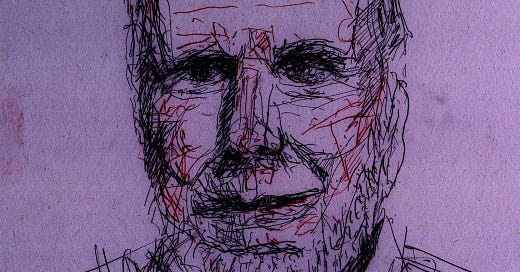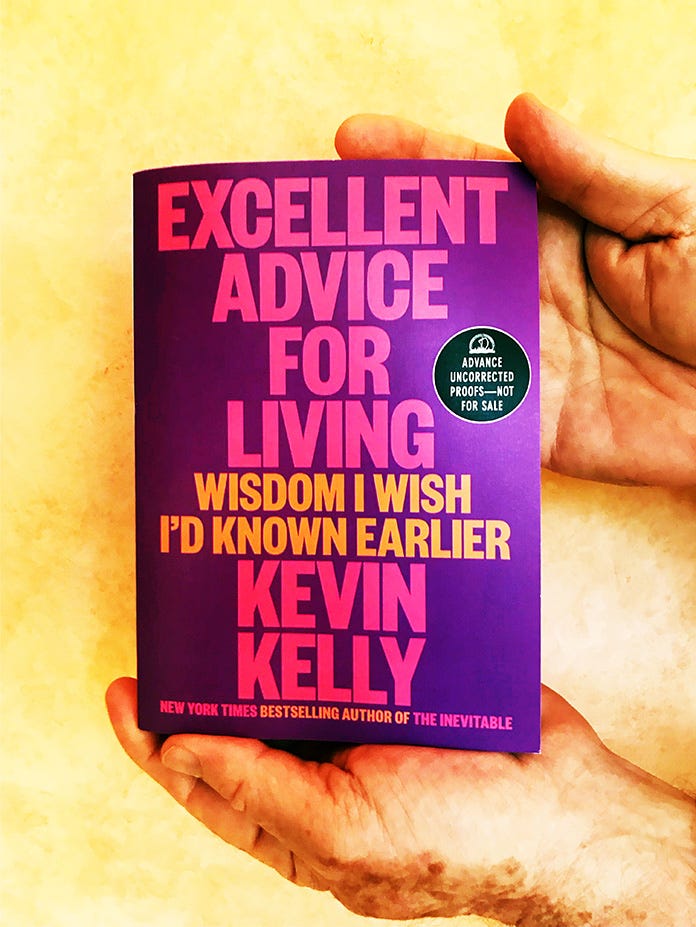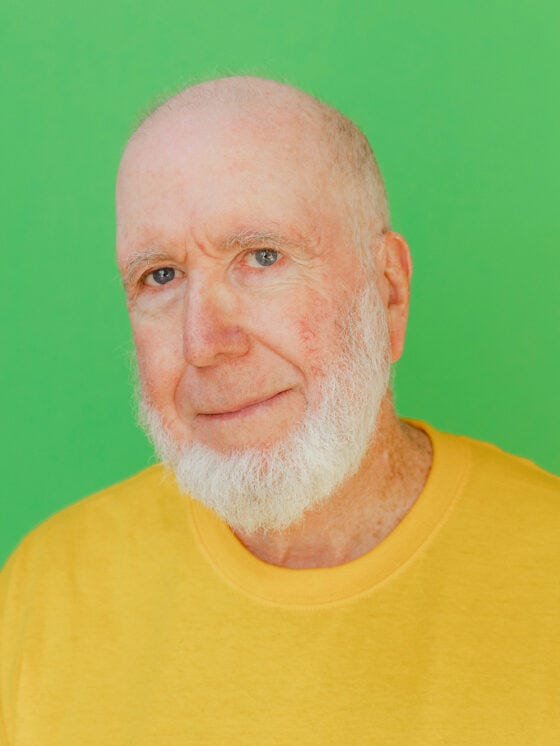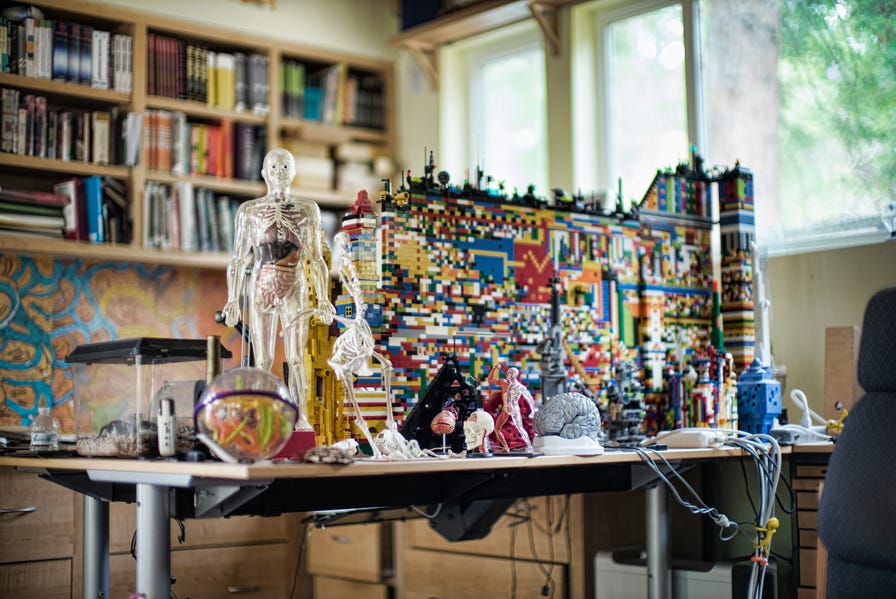The Herb Sundays Sunday Magazine: An interview with Kevin Kelly
On music to work to, advice for living, and partnering with the AIs. A conversation with the irrepressible optimist futurist.
The Herb Sundays Weekend Magazine: Kevin Kelly.
Design and illustration by Michael Cina.
When the opportunity arose to interview Kevin Kelly, I jumped at the chance, even though it didn't fit neatly into the Herb Sundays paradigm. We still covered music, and dove into some interesting topics, so I felt it hit the mark for Herb fans.
is a person who defies definition and sits somewhere between what we used to call a public intellectual, a professional writer/thinker, and sort of a cool uncle/grandparent type who keeps you on your toes. He co-founded Wired magazine (where he still writes often), and has written books such as Out Of Control: The New Biology Of Machines, Social Systems, And The Economic World (1994), The Inevitable: Understanding the 12 Technological Forces That Will Shape Our Future (2016), and his new book Excellent Advice for Living (2023) which does what it says on the tin. The writing of Kelly’s that may be familiar to many is his 1,000 True Fans blog post which forms the backbone of of modern “creator” subscription and fan-supported culture, and greatly informed my previous company Drip.Most importantly for Kelly is that he’s a “professional lifelong learner who uses his writing jobs in order to think, as a means to figure out what I think about it.” Kevin swims in areas of tech and AI where he can intentionally seek out as new challenges. My own relationship to AI has gone from pearl clutchy, to excited, to back again, so I felt it was good for me to speak with someone who has done the work.
The below are sections of our Zoom video conversation, which have been condensed for clarity, as I’m still getting the hang of interviewing.
On music
Sam: Normally, I do more longform writing about people I admire. Some of them are friends and some of them are inspirations, like yourself. I ask them to make a playlist for any given Sunday, say in your workshop or living room. What's your go-to music?
Kevin: Over the years I have become less surrounded by music, and for most the time I enjoy the silence of working. There's two exceptions though. In my car, I listen to podcasts and books. But the exception for music is when I'm writing. I have one song I play on repeat. It just goes around and around and around. It forms kind of like a trance, I don't hear it, but it puts me in the writing state. So I can almost hear this music and be able to concentrate to write. it's a Russian chant, I think the Bulgarian men's choir or something. And it's this this ancient medieval sounding Gregorian chant, basically. And for some reason, it just works for me. And the fact that it's I've heard it a zillion times is it's benefit. So that's one exception.
KK: The second one is when I'm in the kitchen cooking. And there I ask Alexa to play me current pop music. [Alexa chimes in] No, Alexa, stop please.
SV: Modern problems.
KK: Yeah.
So I just like the the latest Pop music, really Pop.
SV: Obviously there's different eras of Pop and you probably have connections to different eras from your life. Why is new Pop better for you?
KK: It's just so I can keep up with what's happening. And I'm happy to listen to you know, Pop from the '90s or the aughts but I might as well stay current, so I'll hear the current stuff. I really like K-Pop a lot and I'll listen to Chinese Pop, Arabic Pop. Whatever.
SV: So has Pop always been your your sound?
KK: I think it's been the older it gets the more poppy I want.
SV: It's a rising Pop interest.
KK: The Pop will rise. Yes.
On his new book
SV: Correct me if I'm wrong, this this particular book has some forebears in the last couple of years on YouTube for instance and some blog posts. Is this sort of a compendium of of your wisdom?
KK: This book, Excellent Advice for Living is currently 450 tweetable little bits of advice that began as a blog post. On my 68th birthday, I was talking about the Irish and Hobbit traditions of giving away presents on your birthday. And I first was inspired to kind of write them down thinking of my son and my daughters, as they are young adults now. I was never preachy and I didn't ever give bits of advice as I'm much more a believer in the idea that kids learn more from what you do than what you say so I tried to teach by doing. And so I thought about things that I've learned and how I wish I had known them, so I decided to try and write a few bits down. And it turned out that I had more to say that after I published those and put them on a blog, they kind of went viral, I was like, “Oh my gosh, I should write some more of these”. Then I decided, you know, it'd be really handy to have a book to give to my kids which could also serve other people.

SV: Your bias towards action seems to be a recurring theme in your work? Just like, “get in there and do it?”
KK: Yep, don't prototype a life, don't make grand plans, just creep with prototypes. You make something great by re-doing it. It took me a long time in the workshop to understand and realize that even the professionals do it this is. That they make and then throw away first. It looks really nice to see this beautiful thing but there's actually probably two versions before that.
And that is that is really so hard to comprehend. But I've gotten used to that, figuring that, okay, the first time I make this, the probably not gonna get it right. And that is very liberating. And if you kind of know that you don't get sweaty about it, it's just the way you're going to do it. It's like rewriting a book. From the start, you just assume that you're going to just rewrite the thing.
On AI and media
KK: Whomever is going to displace Facebook or Google or for that matter, there's going to be plenty of new media coming along, new social media platforms, and there'll be new monopolies and new people, new businesses to complain about, basically. And so no, we're not done yet. We're nowhere near done.
SV: What projects brings meaning to you? I know that you're kind of an essentialist with your time and work to delegate or outsource where able. Can you can talk to me about AI? I know that you're the ever-present optimist. Are there aspects about it that are interesting to you, as far as the future of art, or creativity?
KK: Well, yeah, it's definitely a new art form, and a new medium. And the key framing of it is that it's a partnership with the with the AI and there will be many AIs with different artistic abilities and talents and propensities. So there'll be functions where you can have like a “first pass,” done by the AI that’s like, “okay, these are kind of good I think, I think this is a good suggestion.” I can certainly see that there'll be an AI editing assistant that will take all the things in balance and would learn over time, and you could reward points for getting it close. But it'll be a partner.
So the proper stance here is is partnerships. And I found that the handiest metaphor, for me, is to think of them as alien beings that are very smart and creative, that can even have consciousness, but they're not human. And so it's like Spock, they'll have a different sense of humor, they'll tell a joke, and we're not gonna laugh. And they may not laugh on our jokes. And it's kind of like they have creativity, as there's no human that would ever think that way. And that difference, the fact that they're not human, is the main feature. We're too programmed into the human spirit and there's these alien beings who have a very different view on the world.
And that is going to be so valuable. Because together, we can make up things humans are going to need because we have a really good sense of what we like. But you want to have an AI on your staff who are working together because they're going to have some really crazy stuff and they will be able to think different and thinking different is the engine of the new economy.
SV: I work with musicians and and am involved in record labels so it’s obviously it's a hot topic, you know, what will distinguish it in the future will musicians effectively. That with with music, it's "I can pick this way or that way" so I can, I can see where your vision goes.
KK: You're a conductor, and some of the players are AIs. But you are going to be the producer, and the director. There was this big shift that Brian Eno was involved in, in seeing the studio as an instrument and recognizing that the producer was a musician. And this is just part of that of the understanding that, you know, the producers, and musicians are using are these bots, these AIs. So the idea is that you will partner with these and that together you are making these things. And anybody who has spent even five minutes trying to use them will realize immediately that there's a talent in this.
And it's not like everyone says “what's the prompt?” Believe me, it's not just the prompt, it's hours and hours of conversing with the AIs to draw them out, and the people who are really good at are spending 10,000 hours whispering the magic incantations. there's big of a difference between really great prompters, and in the amateurs, as there are between watercolorists and oil painters, professionals versus amateurs. I'm not trying to become professional in this sense, but I am spending a lot of time amusing myself with the AI art. And it's very clear again to me that it gets better the more time I spend on it.








